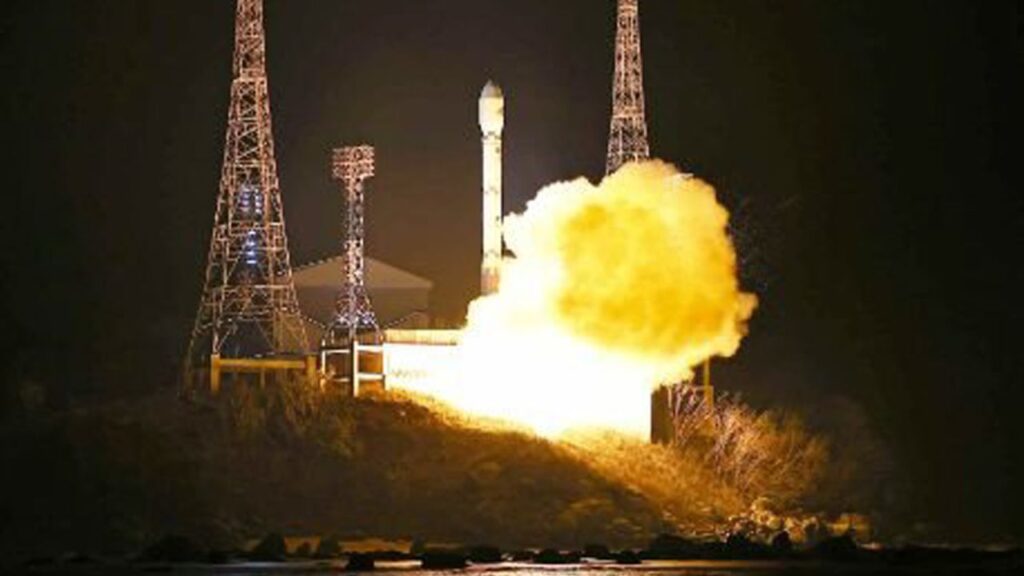Two previous attempts to launch a military surveillance satellite into space this year failed, but North Korea now asserts that the mission was a success.
It follows a September meeting between Kim Jong Un and Russian President Vladimir Putin, during which Moscow extended assistance to Pyongyang regarding its space program.
South Korea states that it has not yet verified whether the satellite is operational.
However, it asserts that it believes Russia assisted the North.
Subsequent to the launch, South Korea declared its intention to reinstate border surveillance along its northern frontier, thus implementing measures to halt portions of a 2018 bilateral agreement between the two nations with the objective of reducing military tensions.
Successful Satellite Launch: Malligyong-1 Enters Orbit
The satellite, designated Malligyong-1, “accurately” entered orbit, according to the North Korean state news agency KCNA, and leader Kim Jong Un reportedly witnessed the launch.
International Condemnation and Security Concerns
The United Nations, which maintains sanctions against North Korea for the development of nuclear missiles, as well as the United States and Japan, among others, have condemned the launch.
The secretary-general of the United Nations stated that any ballistic missile launch by North Korea would be in violation of the pertinent Security Council resolutions.

He reaffirmed his demand that the North resume its denuclearization efforts.
The action was deemed a “blatant transgression” of United Nations resolutions by the White House, and Japan’s Prime Minister, Fumio Kishida, denounced the launch that continued towards the Pacific Ocean after passing over the country’s Okinawa prefecture.
Emergency Warning and Diplomatic Actions
A fleeting emergency warning was issued by the Japanese government, instructing the inhabitants of Okinawa to seek shelter. On Monday, North Korea informed Japan of its renewed intention to endeavor a satellite launch. It had attempted and failed twice this year, in May and August.
The launch was condemned “in the strongest terms” by Mr. Kishida, who added that a complaint had been filed with North Korea.
Mr. Kishida stated that the use of ballistic missile technology, even if the intention is to launch a satellite, is a clear violation of the pertinent United Nations Security Council resolutions.
Furthermore, this issue is of the utmost importance as it threatens the safety of our citizens.
Launch Timing and Satellite Identity
The launch occurred prior to schedule, surpassing the nine-day window that Japan had been duly informed of by Pyongyang. This was scheduled to begin on Wednesday and conclude on November 30 at 23:59 local time (14:59 GMT).
Citing the North’s space agency, KCNA reported that the operation took place at the Sohae launch facility in the northwest of the nation, near the Chinese border.
The verification of North Korea’s assertion regarding the effective launch of the spy satellite remains pending.
If confirmed, the rocket would be the North’s third surveillance satellite launch this year.
Regional Concerns and Collaboration
Japan had previously stated that it would collaborate with South Korea and the United States to “strongly urge” North Korea to abandon the launch, which they claimed would violate United Nations resolutions.
According to the Japan Coast Guard, Pyongyang’s declaration indicated three marine zones for satellite-carrying rocket debris to land.
Two are located west of the Korean Peninsula, while the other is east of Luzon, an island in the Philippines.
The chief director of operations for the South Korean Joint Chiefs of Staff, Kang Ho-pil, issued a warning. He stated that “necessary measures” would be taken in Seoul if the launch went ahead.
Strategic Significance of Surveillance Satellite
A surveillance satellite is highly sought after by Kim Jong Un. This is due to the enhanced precision it would provide in monitoring adversarial incursions and devising his own strategic maneuvers.
However, the UN Security Council has banned Pyongyang’s satellite launches as a pretext to demonstrate missile technology.
South Korea stated that the satellite had “no military utility” after recovering debris from the North’s initial launch in May. Despite failing its second effort in August, Pyongyang’s space agency planned to try again in October but failed.
Vladimir Putin suggested that Moscow may help Pyongyang create satellites after meeting with Mr. Kim in September. However, the explicit nature of the commitment remained ambiguous.
South Korea’s Space Program Plans
South Korea announced its intention to deploy its own reconnaissance satellite by the conclusion of November earlier this month. Launching the satellite will be a rocket manufactured by the American firm SpaceX.
According to reports, Seoul intends to deploy five additional spy satellites into space by the year 2025.





